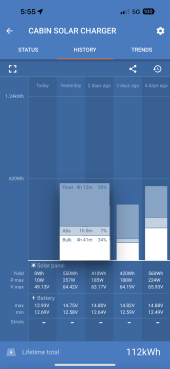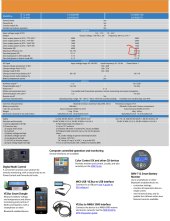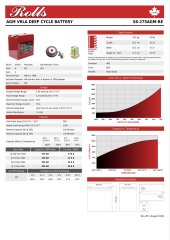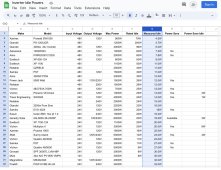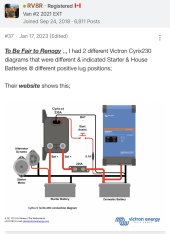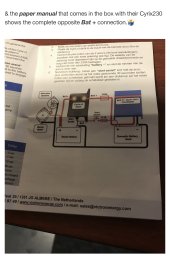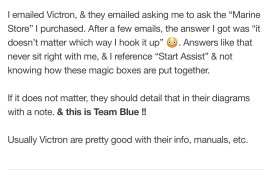Now this is interesting. I was just about to order the victron 100/50 but decided to have a quick look here first.
I should say that our batteries are the cheapest possible leisure I could find on fleabay, and therefore they’re likely to be just starter batteries, at £80 a piece. They were ordered in a rush just to get us through the first few weeks of moving in.
That said, I don’t think lithium on a canal boat is a good idea.. they’re very peculiar about temperature, from what I understand. And temperatures on a steel boat’s bilge are not particularly friendly.
Now, I’m starting to question myself as to why I’m willing to spend £500 on a victron controller (with the accessories), when I couldn’t care less about if the batteries last or not.
I think mainly it’s because I’d like to buy once only, on the solar side. I bought decent panels, and would like to buy a decent controller. And I would like it to be scalable, and I would like it to work.
Those are my only requirements, scalable and that works. Meaning I don’t want a charger that’s not suitable or breaks in a couple months, and also don’t want to be restricted by it in the future.
so, with the new information from @wholybee, I’m wondering if something cheap that can be parallel connected in the future solves the scalability problem, and if it works, it solves the other one..
I’m still unsure about the 12v vs 24v, but that’s another story.. I’m only worried about the efficiency of the buck converter and how I may have to get multiple ones. But I’ll be researching that soon..
I should say that our batteries are the cheapest possible leisure I could find on fleabay, and therefore they’re likely to be just starter batteries, at £80 a piece. They were ordered in a rush just to get us through the first few weeks of moving in.
That said, I don’t think lithium on a canal boat is a good idea.. they’re very peculiar about temperature, from what I understand. And temperatures on a steel boat’s bilge are not particularly friendly.
Now, I’m starting to question myself as to why I’m willing to spend £500 on a victron controller (with the accessories), when I couldn’t care less about if the batteries last or not.
I think mainly it’s because I’d like to buy once only, on the solar side. I bought decent panels, and would like to buy a decent controller. And I would like it to be scalable, and I would like it to work.
Those are my only requirements, scalable and that works. Meaning I don’t want a charger that’s not suitable or breaks in a couple months, and also don’t want to be restricted by it in the future.
so, with the new information from @wholybee, I’m wondering if something cheap that can be parallel connected in the future solves the scalability problem, and if it works, it solves the other one..
I’m still unsure about the 12v vs 24v, but that’s another story.. I’m only worried about the efficiency of the buck converter and how I may have to get multiple ones. But I’ll be researching that soon..



